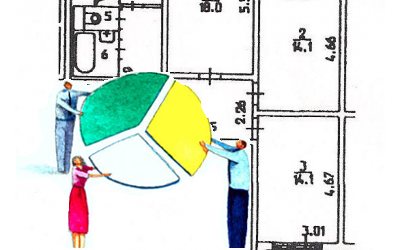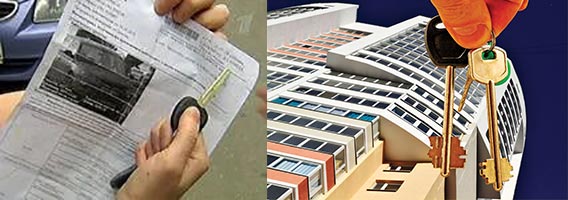Features of the law
Is it possible to privatize a room in a municipal apartment? The regulations for the privatization of housing in the Russian Federation are contained in the Federal Law “On Privatization...” dated July 4, 1991.
According to it, the apartment is privatized exclusively as a whole into shared ownership or into the ownership of one of the registered ones, subject to the refusal of the remaining persons.
Registration of ownership of part of the housing is not provided . But at the same time, a similar action can be carried out if part of the apartment or room is allocated in kind. In this case, the apartment becomes essentially communal.
Article 72 of the Housing Code of the Russian Federation provides for the possibility of exchanging such an apartment for another residential premises provided under a social contract. hiring
Every citizen of the Russian Federation who is permanently registered in municipal housing has the right to one-time participation
If an obstacle to the exercise of this right is the disagreement of someone registered in the apartment, you can try to implement it by registering ownership rights only to your part of the housing .
Goals
Allocating a room and then privatizing it allows you to become the rightful owner of the living space . From the moment of receiving the Certificate of Ownership of the room, the owner can take the following actions:
- Conclude transactions for the alienation of a room (share).
- Register any tenants in your living space without the consent of your neighbors.
- Rent out a room.
- Bequeath this living space.

From the moment of privatization of part of a municipal apartment, the owner becomes the owner of only a certain number of square meters .
He can only use the rest of the area (bathroom, toilet and utility rooms) together with other residents. He will not have property rights to this area.
How to allocate a share?
To acquire ownership rights to a part of an apartment, a mandatory condition is the allocation of this part in the form of a separate share in kind.
Since the law prohibits the privatization of a part of a common object , therefore, the possibility of acquiring ownership rights to a share will become possible if it becomes a separate object.
For this opportunity to arise, part of the apartment must meet the following requirements :
- Represent a separate room or several rooms.
- Have a separate entrance.
- Be a completely isolated room from other rooms.
If it is possible to separate part of the premises, you need to start by contacting the owner of the property - local authorities. Since the division requires redevelopment of the apartment , the application must ask for permission for such actions.
If the answer is positive, you must contact the appropriate organization to draw up a redevelopment project.

divide the premises .
Then a new social tenancy agreement .
The allocated parts of the apartment become separate objects and are privatized in the usual manner.
Procedure for allocating a share
A prerequisite for acquiring ownership rights to a part of an apartment is the allocation of this part in the form of a separate share in kind.
To do this, it is necessary that part of the apartment meets the following requirements:
- was a separate room or several rooms,
- had a separate entrance,
— was a room completely isolated from other rooms.
If it is possible to separate part of the premises, you must contact the owner of the property - local government authorities. Since the division requires redevelopment of the apartment, the application must ask for permission for such actions. If the answer is positive, you must contact the appropriate organization to draw up a redevelopment project. Residents divide the premises after receiving all the necessary permits and documents. A new social tenancy agreement is drawn up for each individual facility.
The owner of the room can perform the following actions from the moment of receiving the certificate of ownership:
— enter into transactions for the alienation of a room (share),
- register any tenants in your living space without the consent of your neighbors,
- rent out a room,
- bequeath living space.
The disadvantage of privatizing a separate room is the lack of rights to common areas.
The owner becomes the owner of only a certain number of square meters from the moment of privatization of part of the municipal apartment.
He can only use the rest of the area (bathroom, toilet, utility rooms) together with other residents, because... he will not have property rights to this area.
By agreement of the parties
How to privatize a room in a municipal apartment? If it is not possible to allocate a room along with part of the bathroom and kitchen, the division can be carried out by agreement of the parties .
In this case, those registered in the apartment draw up an agreement on the right to use the residential premises, which determines which specific room belongs to each resident.
The agreement specifies the following information:
- Parties to the contract. Personal and passport data, information about the date of registration in the apartment.
- Address and characteristics of the premises.
- Distribution of rooms between residents, indicating their area.
The document is signed by the parties and certified by a notary.
is given a specific room for use , the rest of the apartment remains for joint use.
Thus, the apartment becomes communal with isolated living spaces and common areas.
How is part of a municipal apartment privatized without the consent of the residents?
Privatize a share in a municipal apartment
The area of living quarters in the communal apartment is added, and then the amount must be divided by the area of the room that has been privatized. The value that came out will be the value of the share belonging to the new owner in the commonly used premises. All calculations performed must be certified in writing, with the signatures of other citizens living in the communal apartment.
We recommend reading: Is it possible to sell shares in an apartment without the consent of other owners
The specified premises treat each of the tenants equally, the procedure for their operation must be approved on the terms of the concluded agreement, a certain mutual agreement. What happens if a tenant privatizes one of the rooms? A certain share of the previously mentioned common areas must also be allocated.
Drawing up a separate rental agreement
Is it possible to privatize a share in a municipal apartment without the consent of the other residents? If it is not possible to reach an agreement with the residents of the apartment peacefully, the privatization of a share in a municipal apartment can only be carried out by drawing up a separate lease agreement .
In this case, the last word remains with the owner of the premises, that is, local authorities.

conclude new social tenancy agreements for the occupied living space.
It is quite difficult to achieve a positive decision from the authorities in this case, since turning the apartment into a communal apartment is not profitable for the authorities.
But if there are compelling arguments and a loyal attitude from local governments, this option is still possible .
If the authorities meet citizens halfway and conclude several rental agreements with residents of a municipal apartment, each of them will become the owner of a room and will be able to acquire ownership rights to it.
If the authorities refuse to carry out the procedure, you can try to resolve the issue through the court . A citizen files a claim for the renegotiation of social tenancy agreements.
Residents must prove that there is no family relationship and they run their household separately. When filing such a claim in court, it is advisable to seek the help of an experienced lawyer.
How to privatize your share separately
Knowing that residents of communal apartments do not need the consent of their neighbors to privatize their room, some residents of municipal housing who found themselves in the situation described above began to try to transfer it to communal status in order to then privatize their room in the apartment without any problems.

But is it as simple as it seems? Let's try to figure it out in detail.
It is necessary that part of the apartment really becomes a separate object, and for this it must satisfy the following conditions:
- be a room completely isolated from other rooms;
- have your own entrance into it.
If this is technically feasible, the following actions can be taken:
- Contact the municipal authorities, since they are the owner of this property. Since redevelopment of the apartment will be required, it is necessary to write an application requesting permission.
- If a positive response is received, a redevelopment project must be drawn up and approved by all relevant authorities.
- Then the actual division of the premises takes place, and a new social tenancy agreement is drawn up for each newly formed object.
The part allocated in this way can be privatized in accordance with the general procedure.

In this case, the disadvantage of this method is the lack of property rights to common areas; the owner will not have it. You can use the bathroom, restroom, and utility rooms only together with other residents.
Privatization by agreement
In some cases, a municipal apartment turns into a communal apartment by agreement between the residents. In this case, having previously agreed among themselves, they draw up an agreement about which room will belong to a particular person.

Such an agreement must indicate:
- full information about each of the parties to the agreement;
- address and technical characteristics of the apartment;
- distribution of rooms according to their exact area.
This document is signed by all participants, then the agreement is certified by a notary office.
Thus, everyone has a separate room, while the rest of the area remains for common use, that is, the apartment becomes communal. Having such an agreement in hand, you can apply for the privatization of a separate room.
Privatization without the consent of other residents
If the issue cannot be resolved peacefully, all that remains is to try to draw up a separate lease agreement. This is the only way to achieve privatization of a share in a municipal apartment.
You should start with the same action as in the first case - by contacting the municipality, this time with a request to conclude new social tenancy agreements for the disputed living space.
It should be noted right away that it will be extremely difficult to obtain a positive decision, since the transition of municipal housing to communal housing is completely unprofitable for local authorities, from any point of view. But, if there are sufficiently compelling arguments, a loyal approach on the part of the local administration is still not excluded.

If she gives her consent to renew the contracts, then each of the residents will become the tenant of a separate room and will be able to independently privatize it.

If you receive a refusal, you can make an attempt to resolve the issue by contacting the judicial authorities by filing a statement of claim for the re-conclusion of social rent agreements.
In court it will be necessary to prove that there are no family relations between the residents and the household is run separately.
If before this it was possible to split the personal account through a management company, this will be an additional plus to the evidence base. If not, it can be divided through the court by filing an appropriate claim.
If the court decision is made in favor of the plaintiff, you will need to draw up a separate social rental agreement in the municipality and proceed to the following stages of privatization of the room:
- BTI draws up a floor plan and issues a technical passport;
- Based on these documents, a separate cadastral passport for the room is issued.
After these papers are received, the room can be registered as property. An application for privatization and a package of the following documents are submitted to the relevant authority:
- applicant's passport;
- new documents for the room;
- rental agreement;
- a copy of a separate personal account;
- extract from the house register;
- certificate of non-participation in the privatization of other housing;
- receipt of payment of state duty.
It usually takes about two to three months for the application to be reviewed, then a decision is made.

Thus, we see that the process of privatizing a room or part of a municipal apartment is quite costly, complex, and requires contacting numerous authorities.
It is extremely difficult to deal with it alone, without the help of an experienced lawyer, and get a positive result.
Therefore, in this situation, the most prudent decision would be to seek professional help.
790
Division of personal accounts
How to divide the personal account of a municipal apartment? An important step in allocating a share of an apartment is the division of personal accounts . Because the room becomes a separate object, such action becomes possible.
A registered citizen needs to submit an application to the Criminal Code or another organization that calculates payments. The application must be accompanied by a passport and a rental agreement. A separate account is opened for a specific room with a width of at least two square meters.
In Moscow, the minimum size of such a room should be 9 square meters . The size is not defined in the Housing Code of the Russian Federation, so other regions set their own standards.
If there is no agreement between residents or a separate social tenancy agreement, division of personal accounts is possible only through the court .
You can learn how to divide a personal account in a privatized apartment from our article.
Stages of room privatization

To do this, you need to contact the BTI. Based on these documents, a separate cadastral passport .
From the moment these documents are received, the room becomes a separate piece of real estate, and it can be registered as a property under general conditions.
An application for privatization with a package of documents is submitted to local governments:
- applicant's passport;
- documents for the apartment;
- rental agreement;
- copy of personal account;
- certificate of registration;
- certificate of non-participation in privatization;
- receipt of payment of state duty.
You can find out where to start the privatization process and in what cases a refusal may be received on our website.
How can you privatize a municipal apartment in 2021?
- receipts for utility bills;
- in case of a change of surname, a certificate of change of surname must be provided;
- a certificate if a minor child has left the apartment;
- document on the death of a citizen who was registered in the apartment;
- a certificate stating that residents have not previously used their right to free privatization.
- passports of all participants in privatization and birth certificates of children under 14 years of age;
- registration certificate of the apartment from their BTI. If redevelopments have been carried out in the apartment, this technical document should reflect their legality;
- extracts from the warrant for the apartment;
- an extract from the house register, which indicates all registered citizens, as well as everyone who was deregistered during the entire history of using the apartment;
- social rent agreement;
- certificate about the condition of the living space;
- an extract from the personal account stating that there is no debt on utility bills;
- in the case of registered minors, permission from the guardianship authority, as well as an order to appoint a guardian for the child;
- if one of the residents refuses privatization, a notarized written refusal is required;
- if privatization is carried out by an official representative of the residents, he must provide a notarized power of attorney as confirmation of his authority;
- receipt of payment of state duty.
We recommend reading: Calculation of Depreciation of a Residential Building by Year of Construction






